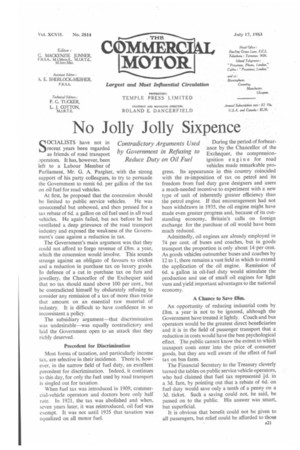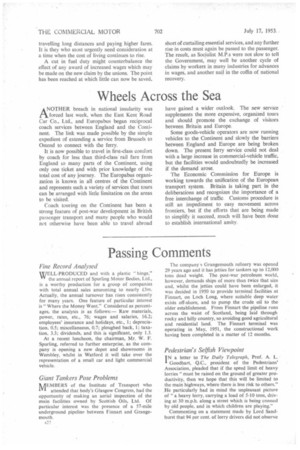No Jolly Jolly Sixpence
Page 23

Page 24

If you've noticed an error in this article please click here to report it so we can fix it.
SOCIALISTS have not in recent years been regarded as friends of road transport operators. It has, however, been left to a Labour Member of Parliament, Mr. G. A. Pargiter, with the strong support of his party colleagues, to try to persuade the Government to remit 6d. per gallon of the tax on oil fuel for road vehicles.
At first, he proposed that the concession should be limited to public service vehicles. He was unsuccessful but unbowed, and then pressed for a tax rebate of 6d. a gallon on oil fuel used in all road vehicles. He again failed, but not before he had ventilated a deep grievance of the road transport industry and exposed the weakness of the Government's case against a reduction in tax.
The Government's main argument was that they could not afford to forgo revenue of am. a year, which the concession would involve. This sounds strange against an obligato of favours to cricket and a reduction in purchase tax on luxury goods. In defence of a cut in purchase tax on furs and jewellery, the Chancellor of the Exchequer said that no tax should stand above 100 per cent., but he contradicted himself by obdurately refusing to consider any remission of a tax of more than twice that amount on an essential raw material of industry. It is difficult to have confidence in so inconsistent a policy.
The subsidiary argument—that discrimination was undesirable—was equally contradictory and laid the Government open to an attack that they richly deserved.
Precedent for Discrimination Most forms of taxation, and particularly income tax, are selective in their incidence. There is, however, in the narrow field of fuel duty, an excellent precedent for discrimination. Indeed, it continues to this day, for only the fuel used by road transport is singled out for taxation.
When fuel tax was introduced in 1909, commercial-vehicle operators and doctors bore only half rate. In 1921, the tax was abolished and when, seven years later, it was reintroduced, oil fuel was exempt. It was not until 1935 that taxation was equalized on all motor fuel. During the period of forbearance by the Chancellor of the Exchequer, the compressionignition engine for road vehicles made remarkable progress. Its appearance in this country coincided with the re-imposition of tax on petrol and its freedom from fuel duty gave designers and users a much-needed incentive to experiment with a new type of unit of inherently greater efficiency than the petrol engine. If that encouragement had not been withdrawn in 1935, the oil engine might have made even greater progress and, because of its outstanding economy, Britain's calls on foreign exchange for the purchase of oil would have been much reduced.
Admittedly, oil engines are already employed in 74 per cent. of buses and coaches, but in goods transport the proportion is only about 14 per cent. As goods vehicles outnumber buses and coaches by 12 to 1, there remains a vast field in which to extend the application of the oil engine. Remission of 6d. a gallon in oil-fuel duty would stimulate the production and use of small oil engines for light vans and yield important advantages to the national economy.
A Chance to Save £8m.
An opportunity of reducing industrial costs by am. a year is not to be ignored, although the Government have treated it lightly. Coach and bus operators would be the greatest direct beneficiaries and it is in the field' of passenger transport that a reduction in costs would have the best psychological effect. The public cannot know the extent to which transport costs enter into the price of consumer goods, but they are well aware of the effect of fuel tax on bus fares.
The Financial Secretary to the Treasury cleverly turned the tables on public service vehicle operators, who had claimed that fuel tax represented id. in a 3d. fare, by pointing out that a rebate of 6d. on fuel duty would save only a tenth of a penny on a 3d. ticket. Such a saving could not, he said, be passed on to the public. His answer was smart, but superficial.
It is obvious that benefit could not be given to all passengers, but relief could be afforded to those A21 travelling long distances and paying higher fares. short of curtailing essential services, and any further It is they who most urgently need consideration at rise in costs must again be passed to the passenger.
a time when the cost of living continues to rise. The result, as Socialist M.P.s were not slow to tell A cut in fuel duty might counterbalance the the Government, may well be another cycle of effect of any award of increased wages which may claims by workers in many industries for advances be made on the new claim by the unions. The point in wages, and another nail in the coffin of national has been reached at which little can now be saved. recovery.




















































































